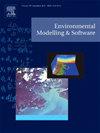Historical simulation performance evaluation and monthly flow duration curve quantile-mapping (MFDC-QM) of the GEOGLOWS ECMWF streamflow hydrologic model
IF 4.8
2区 环境科学与生态学
Q1 COMPUTER SCIENCE, INTERDISCIPLINARY APPLICATIONS
引用次数: 0
Abstract
Global hydrological models are essential for managing water resources and predicting hydrological events. However, the local-scale usability of global models challenges big-data management, communication, adoption, and validation. Validation is the biggest challenge bercause of the need for large-scale data management and model calibration, which requires extensive and often inaccessible observed data. This study assesses the GEOGLOWS-ECMWF Global Hydrologic Model, revealing systematic biases that impact its accuracy. We propose a bias-correction methodology using flow duration curves to align non-exceedance probabilities of simulated and observed streamflow, significantly improving the GEOGLOWS model. Unfortunately, this approach does not inherently improve simulations in ungauged locations. The methodology not only enhances the GEOGLOWS model's accuracy but also stands as a versatile solution applicable across various hydrological models. This bias correction approach provides a tool for improving hydrological predictions and gives users the confidence to use global models for local water resource management and decision-making processes.
GEOGLOWS ECMWF 溪流水文模型的历史模拟性能评估和月流量持续时间曲线量化绘图 (MFDC-QM)
全球水文模型对于管理水资源和预测水文事件至关重要。然而,全球模型在地方范围内的可用性对大数据管理、交流、采用和验证提出了挑战。验证是最大的挑战,因为需要大规模的数据管理和模型校准,而这需要大量且通常无法获取的观测数据。本研究对 GEOGLOWS-ECMWF 全球水文模型进行了评估,揭示了影响其准确性的系统性偏差。我们提出了一种偏差校正方法,利用水流持续时间曲线来调整模拟和观测水流的非超标概率,从而显著改善 GEOGLOWS 模型。遗憾的是,这种方法并不能从本质上改善无测站地点的模拟。该方法不仅提高了 GEOGLOWS 模型的准确性,也是适用于各种水文模型的通用解决方案。这种偏差修正方法提供了一种改进水文预测的工具,使用户有信心将全球模型用于当地水资源管理和决策过程。
本文章由计算机程序翻译,如有差异,请以英文原文为准。
求助全文
约1分钟内获得全文
求助全文
来源期刊

Environmental Modelling & Software
工程技术-工程:环境
CiteScore
9.30
自引率
8.20%
发文量
241
审稿时长
60 days
期刊介绍:
Environmental Modelling & Software publishes contributions, in the form of research articles, reviews and short communications, on recent advances in environmental modelling and/or software. The aim is to improve our capacity to represent, understand, predict or manage the behaviour of environmental systems at all practical scales, and to communicate those improvements to a wide scientific and professional audience.
 求助内容:
求助内容: 应助结果提醒方式:
应助结果提醒方式:


